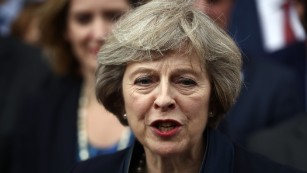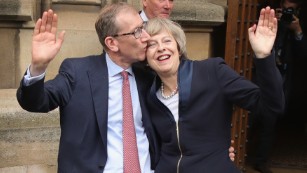May was first elected as a Conservative member of parliament in 1997. She earned a reputation as a modernizer, calling in 2002 for a more inclusive party and warning that many voters saw the Conservatives as the “nasty party.” She briefly served as party chair before assuming her current role of home secretary in 2010.
May has a reputation as a serious-minded workaholic and has been dubbed a “safe pair of hands” by supporters. They maintain that she can be trusted to steer the country as the U.K. begins the fraught process of divorcing the European Union as called for under the Brexit referendum held last month.
Here are five key questions about May and the U.S.
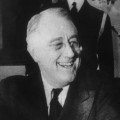



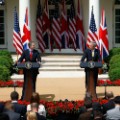
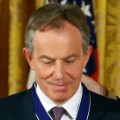


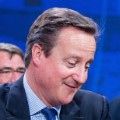
How close is May to America?
Outgoing Conservative PM David Cameron — who announced his resignation after losing the Brexit vote — and predecessors Gordon Brown and Tony Blair of Labour were all familiar to Washington before becoming the head of the British government. They spent years as prime-ministers-in-waiting in previous governments or led the opposition.
May, in contrast, is a virtual unknown to the American public and lacks a lengthy record on cross-Atlantic relations to serve as a letter of introduction.
The Atlantic Council’s Frances Burwell noted that some of the better-known candidates to replace Cameron, like former London Mayor Boris Johnson, took themselves out of the running, making it “a surprise,” though “not a shock,” that May won the party’s leadership contest.
“She really hasn’t spoken on these issues,” Heather Conley of the Center for Strategic and International Studies, a Washington-based think tank, told CNN.
May has, however, made comments on the broad connection between the historically close international partners.
“I know as well as anybody the strength and importance of that partnership,” she said in an April speech on Brexit, which both she and the U.S. opposed.
“She acts on British interests” is how Burwell put it, noting that May would likely “not be particularly sentimental” when it comes to issues like the U.S.-UK “special relationship.”
What are her ties to the intelligence community?
One group in the U.S. does know her well, however: the American intelligence community. May’s role as home secretary has allowed her to engage closely with American spy and law enforcement agencies on counterterrorism issues.
“She is a well-known entity” to U.S. intelligence, counterterrorism and law enforcement communities, according to Conley.
In April, May reaffirmed the U.S.-UK intelligence bond, saying, “Our security and intelligence agencies have the closest working relationship of any two countries in the world — and I know that it would certainly survive Britain leaving the EU.”
May did rankle a few feathers in the U.S., though, when she blocked the extradition of hacker Gary McKinnon on human rights grounds. McKinnon, who was diagnosed with Asperger’s, had infiltrated U.S. government computers.
“I stood up to the American government and I stopped it,” May said in her speech announcing her leadership bid in June.
But May was also willing to push for the extradition of alleged terrorist Abu Qatada to Jordan despite opposition from the European Court of Human Rights.
What’s her worldview?
May’s focus as prime minister will likely be on negotiating a new relationship with the EU and “steadying the markets and the economy” in the wake of Brexit, Conley said.
Although May campaigned to remain in the EU, she is widely seen as a “Eurosceptic” and has said repeatedly that she will honor the result of the referendum despite calls from some quarters for a re-vote.
“I’ve been clear that Brexit means Brexit,” May said in an interview shortly before winning the leadership contest.
On the foreign issues she’s addressed, she has staked out ground in keeping with the relatively hawkish pro-U.S. and NATO mainstream of the Conservative Party.
May strongly backed the U.K. decision to launch airstrikes against ISIS in Syria.
“These people have taken the conscious decision to make themselves our enemies,” she said. “If they want to take the lives of British citizens, we will make sure that they have no place to hide.”
And on one of the first votes likely to occur during her premiership — whether to keep Britain’s sole nuclear delivery system, the Trident submarine system — Maywrote in the Daily Mail newspaper last week that “it would be sheer madness to contemplate even for a moment giving up Britain’s independent nuclear deterrent.”
On the U.K.’s other defense commitments, such as its recent decision to deploy a battalion to Estonia to deter Russian aggression and its position as NATO’s second-biggest defense spender, Conley sees May as likely to maintain the policies made by the Cameron government.
“She is tough, steely, no-nonsense,” someone who when they “commit to something, they commit to it,” Conley said.
In her Daily Mail op-ed, May affirmed her belief in continuing to meet the NATO target of spending 2% of GDP on defense, saying, “as Britain leaves the European Union, we remain committed to working alongside our NATO allies and playing our full role in the world.”
How will she get along with Obama — and Clinton or Trump?
May shares some similarities with each of the presidential candidates that could give them some common ground to build on.
Like Trump, May is known for taking a hard line on immigration.
“There is a limit to the amount of immigration any country can and should take,” May said in her 2015 Conservative Party Conference speech, citing the party manifesto that says, “we must work to control immigration and put Britain first.”
Despite her rhetoric, though, May has not advocated deportations of illegal immigrants on the scale proposed by Trump.
May’s tenure as home secretary also earned her a reputation as a hard-working “wonk,” serious about issues and policy intricacies. Clinton detractors and supporters alike have often applied the same description to the former senator and secretary of state.
While she is more similar to Trump in her desire to stem immigration and protect national sovereignty, she edges closer to Clinton when it comes to backing international engagement and the need for multilateral military intervention through organizations like NATO.
And like President Barack Obama, May is not known for socializing with members of the opposition — a criticism both Republicans and Democrats have leveled at the President.
“I don’t gossip about people over lunch. I don’t go drinking in Parliament’s bars,” May said at the launch of her leadership bid in June.
Even if May and Obama don’t take in a college basketball game while munching on hotdogs as Obama and Cameron once did in Ohio, the White House is sure the two leaders will get along just fine.
They had at least one extended conversation prior to her entering the leadership contest, according to White House Press Secretary Josh Earnest, who spoke of their anticipated relationship ahead of Wednesday’s transfer of powers.
“If in fact Theresa May is the next prime minister of the UK, the President is entirely confident he and his successor will be able to coordinate effectively with her to not just protect but even advance the special relationship between our two countries,” Earnest told reporters Monday.
Is the US glad to see May take over?
Given official U.S. opposition to Brexit and worry that the vote would damage international markets, May’s assumption of the premiership could help allay some of America’s worst fears.
Though she still plans to leave the EU, her steadiness is reassuring for U.S. officials watching economic indicators and hoping for seamlessness on national security matters.
And the fact that the British leadership change is happening quickly and calmly, after colorful figures such as Johnson bowed out early on, mean that the two countries can get down to business without delay.
At the least, U.S. officials seem to welcome the stabilizing effect a new PM might bring.
“This is a partnership that matters a lot. Their ability to smoothly and sensibly manage the transition that is now before them obviously matters to us,” a State Department official told CNN.
“And if this transition between prime ministers contributes to that effort, then we will consider that all the better,” the official added.

























